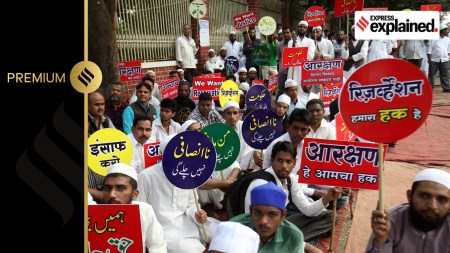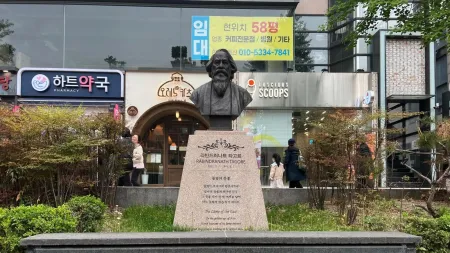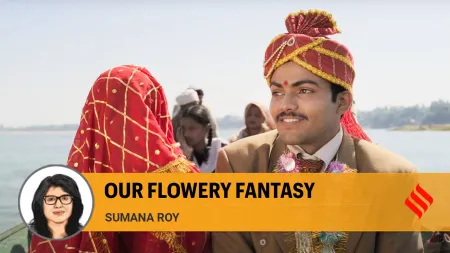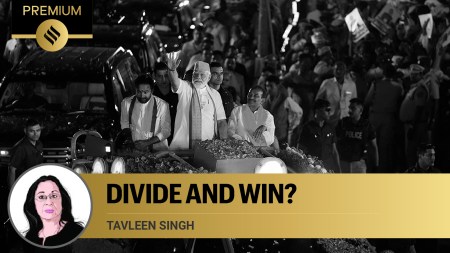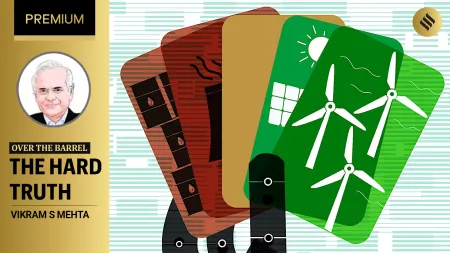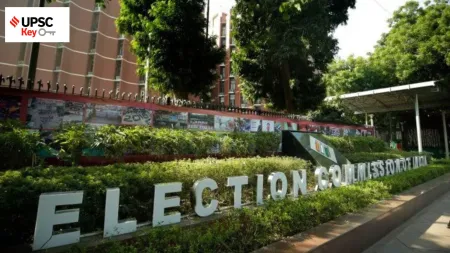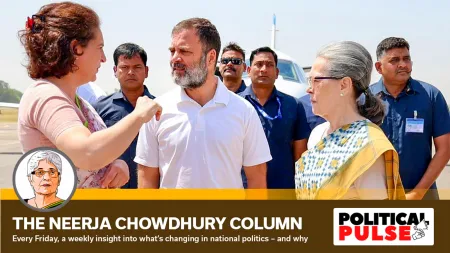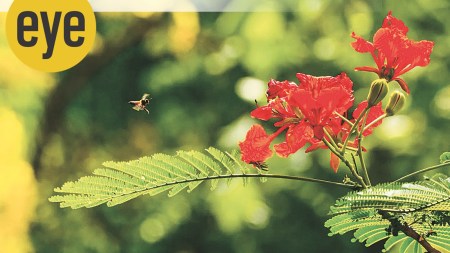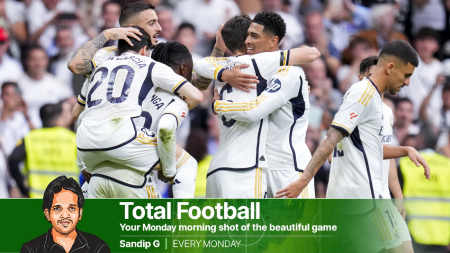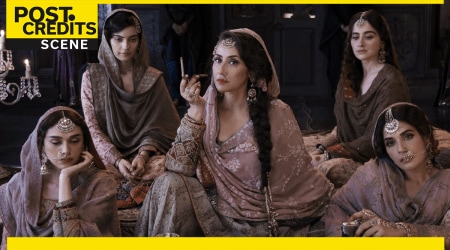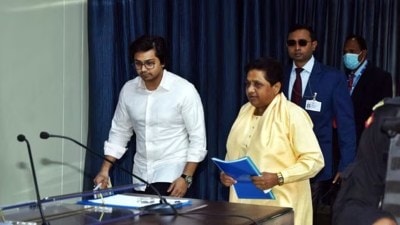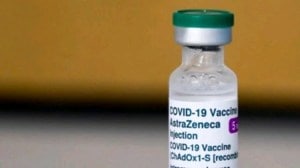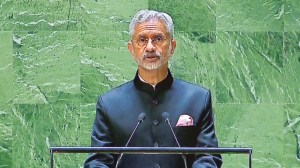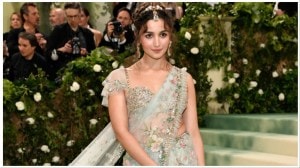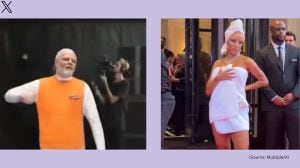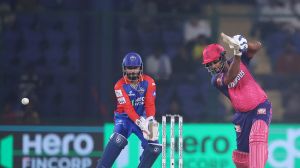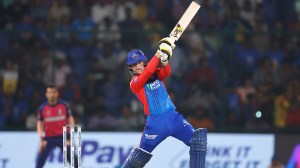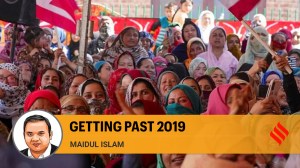- India
- International
Explained: What’s behind the new anti-India campaign in the Maldives?
The theme of the rally was “India Out”, a slogan coined two years ago by protesters who claimed that the MDP government led by President Ibrahim Solih had “sold out” the Maldives to India.
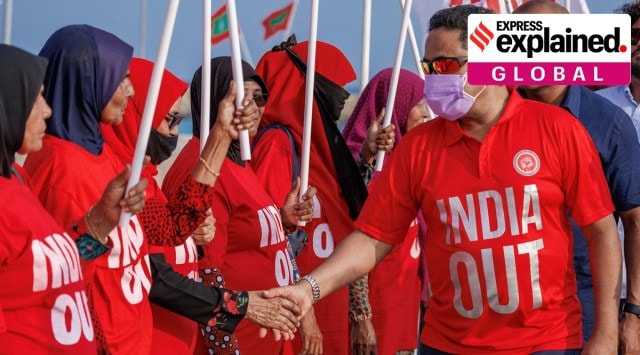 Abdulla Yameen, chief of the Progressive Party of Maldives, meets his supporters during an "India Out" protest rally in Naifaru, Maldives. (Reuters)
Abdulla Yameen, chief of the Progressive Party of Maldives, meets his supporters during an "India Out" protest rally in Naifaru, Maldives. (Reuters)On March 23, the Maldivian Parliament accepted an emergency motion disallowing a planned opposition rally two days later in the capital Male. It had been called by former president Abdulla Yameen and his Progressive Party, and its ally, the People’s National Congress.
The emergency motion was moved by Abdulla Jabir, a member of former president Mohamed Nasheed’s Maldivian Democratic Party (MDP). It stated that the rally was endangering national security, and sowing discord between the Maldives and one of its neighbours. It asked the Maldivian National Defence Forces to stop the rally and other similar events.
The theme of the rally was “India Out”, a slogan coined two years ago by protesters who claimed that the MDP government led by President Ibrahim Solih had “sold out” the Maldives to India.
The protest, a day before External Affairs Minister S Jaishankar arrived in the country, was not allowed to take place, with police cracking down on rallyists travelling to the event in Male from other parts of the country.
🗞️ Subscribe Now: Get Express Premium to access the best Election reporting and analysis 🗞️
Political context in Maldives

A small country of about 500,000 people that won democracy only in 2005, and which lies at a strategic crossroads of the Indian Ocean, Maldives has been buffeted over the last decade or more by the geopolitical crosswinds in the region.
India and China have vied for influence in the Maldives over the last 10 years. Islamists have also found a hunting ground in the country, where Islam is the state religion. All this while, the country has experienced the political ups and downs that democracy has brought.
As the closest big neighbour, India has been Maldives first responder for decades in all sectors, the relationship cemented by the strongman former president Maumoon Abdul Gayoom, who was the unchallenged ruler of the country until the closing years of the 20th century. In a sensational South Asian moment of the time, India’s National Security Guard thwarted a planned coup against Gayoom by a businessman who had hired Sri Lankan Tamil militant group PLOTE for firepower.
Over the last two decades, as political parties fought elections to win office, foreign policy has played a big role, tied as it is to the small country’s economic development. The period coincided with China’s rise and its projection of power in the region and beyond.
Beijing’s outreach in a part of the Indian Ocean where India was the pre-eminent power has seen the geopolitical rivalry play out in the national politics of both Sri Lanka and Maldives. In the Maldives, the MDP, and its top leaders, especially Nasheed, are seen as pro-India, while rival Yameen is seen as a China proxy.
In the last presidential and parliamentary elections in 2018, the MDP was voted back to office. Nasheed could not contest because of a conviction under the Yameen government, and Ibrahim Solih became President. Yameen was convicted on corruption charges soon after.
With a friendly government in Male, India has been able to rebuild bilateral ties and regain some of its previous influence after a six-year gap during the Yameen presidency that saw relations dip to their lowest point.
Yameen’s release in December 2021 from a long house arrest after the Maldives Supreme Court overturned his conviction, led to an immediate increase in the pitch and frequency of the anti-India rallies. Protesters carry posters of the politician, who is a half-brother of Gayoom’s. Yameen has been present at some of these protest sites, and led some rallies.
The next presidential and parliamentary elections are in 2024, and Yameen is using the campaign to shore up his support base, by painting the MDP as a party that has enslaved the country to India.
Claims by “India Out” protesters
What began as a general protest at the Solih government’s perceived India-friendly policies has now turned into an allegation that New Delhi has sent a large military contingent to the Maldives, a claim that the Solih government has repeatedly denied.
Attention has focused particularly on the co-operation between the two sides to develop a harbour on the Uthuru Thilafalhu (UTF) atoll for the Maldivian coast Guard. The Solih government has said there are no Indian military personnel in the Maldives other than a maintenance and flight crew operating three Dornier aircraft used for surveillance, and for rescue and air ambulance operations.
In a statement on March 13, the Maldives Defence ministry said there were no foreign military personnel on UTF, which is being developed as a dockyard for the Maldivian coast guard.
“Statements that allege UTF to be a foreign military base are simply untrue,” the Defence Ministry said.
Security co-operation with India
In February 2021, India and Maldives signed an agreement for the development of the UTF harbour during Jaishankar’s visit at the time. The Union Minister had tweeted at the time that the project would “strengthen Maldivian Coast Guard capability” and described the two countries as “partners in development and partners in security”. During the same visit, India extended a $ 50 million line of credit for defence purchases.
 The defence Line of Credit would “facilitate capability building in the maritime domain”, Jaishankar had said at the time. A joint statement said the two sides had agreed to strengthen coordination in enhancing regional maritime security, and focus on combating terrorism in “all its forms and manifestations”.
The defence Line of Credit would “facilitate capability building in the maritime domain”, Jaishankar had said at the time. A joint statement said the two sides had agreed to strengthen coordination in enhancing regional maritime security, and focus on combating terrorism in “all its forms and manifestations”.
Maldives is also part of the India-driven Indian Ocean mini-lateral Colombo Security Conclave, in which the other members are Sri Lanka, and the newly admitted Mauritius. Bangladesh and Seychelles are expected to join soon. The NSAs of these countries met in Male earlier in March to underline “shared security objectives” in a region where India sees itself as the net security provider. Last November, the Indian Navy, Maldives National Defence Force, and the Sri Lankan Navy conducted a two-day exercise in the Exclusive Economic Zones of the three countries in the southern Arabian Sea. Code-named “Focused Operation”, it was aimed at “building understanding and interoperability” between the lead maritime security agencies of the three countries, according to an official release on the operation.
Maldives signed a defence pact with the United States in 2020. Last month, the Maldives signed an agreement to allow the US to open an embassy in the country, the first western nation to do so. At the moment, the US ambassador to Sri Lanka doubles up for the Maldives.
Domestic politics in the country
While Yameen hopes to use Maldivian nationalism to come back to power on an anti-India plank, the government has countered this by underlining that the country, which imports virtually all its requirements, is dependent on India for its security, including food security.
The MDP has begun its own “India First” campaign, and even drafted a legislation to criminalise anti-India protests as anti-national. The legislation was dropped, but the sentiment behind it led to the banning of the “India Out” protest in Male last week.
Newsletter | Click to get the day’s best explainers in your inbox
Yameen also hopes to politically leverage the differences between President Solih and Nasheed. The two have largely managed to keep these differences from coming in the way of the work of government, but last year’s assassination attempt on Nasheed, traced to a local Islamist group, saw the former president come out openly against the government for not taking tough steps against such forces.
An MDP defeat in a local election saw the differences spill out into the open. Nasheed wants Solih to use the MDP’s two-thirds majority in Parliament to change Maldives from a presidency to one in which a Prime Minister heads the government.
More Explained
EXPRESS OPINION
May 08: Latest News
- 01
- 02
- 03
- 04
- 05



